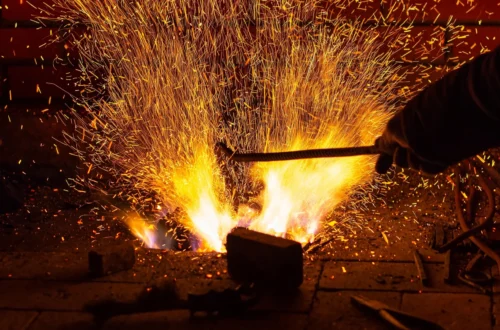Julie Gould 00:09
Hello, and welcome to Working Scientist, a Nature Careers podcast. I’m Julie Gould. This is the third episode of the career planning series, supported by the International Science Council.
Julie Gould 00:28
Career planning can take many forms, and one effective approach is to set a clear plan and stick to it. Start by envisioning where you want to be in two, five, or ten years. Create SMART goals—specific, measurable, action-oriented, realistic, and time-bound—and chart your course to achieve them.
Some individuals pursue their plans with intense focus, driven by a clear passion. This focused approach allows them to develop expertise and build credibility. In competitive fields like science, maintaining focus can enhance opportunities for funding, recognition, and career milestones. For many, this structured path aligns well with their personality, fostering a preference for stability and consistent progress.
In this episode, we’ll hear career stories from two individuals who exemplify this focused approach. They have had a clear idea of their career aspirations from the beginning, and we’ll learn how they turned their dreams into reality.
As in previous episodes, we’ll also feature a sponsored segment from the International Science Council, with support from the China Association for Science and Technology.
The ISC is examining how early and mid-career researchers can effectively navigate their careers in a scientific landscape that is constantly changing through discussions with both emerging and established scientists.
Julie Gould 01:51
Our first guest is Professor Sam Smith, a behavioral oncologist at the University of Leeds in the UK. I spoke with Sam to discover how he pursued his passion with the same intensity one might expect from an athlete pushing their limits.
Sam found his passion during the final year of his psychology undergraduate studies when he was given a chance to explore emotional contexts surrounding cancer.
Sam Smith 02:18
It felt like the right direction for me. I was presented with an incredible opportunity to work in a remarkable research group and with an exceptional team. I aimed to maximize that opportunity, and I still strive to push my boundaries.
Julie Gould 02:39
With such drive, did you start setting goals or identifying stepping stones to your future?
Sam Smith 03:01
I never specifically aimed for job titles. My ambitions focused on applying for specific funding streams and had long held aspirations to work in the United States. Though it didn’t materialize at the university level, I secured a postdoc position there. Alongside that, I aimed to conduct my own research based on ideas I wanted to explore and set ambitions for early postdoc awards, which led to opportunities for mid-career and senior awards later on.
It wasn’t about becoming a professor per se; it was about winning funding to pursue interesting science and tackle significant cancer-related issues. Although I may have voiced the desire to become a professor, my actions were more about the journey that would naturally lead me there.
Julie Gould 04:24
As Sam progressed in his career, his ambitions evolved as he began a family.
Sam Smith 04:30
With family came a stronger focus on career ambitions. Titles translate to higher salaries, and I applied for promotions when my first child was born and again with my second. I aspired to reach those titles of associate professor and professor in due course.
Julie Gould 04:55
How critical is having a strategy to achieve and plan for that goal?
Sam Smith 05:03
I may appear very strategically focused, and I have a career and research plan, but flexibility is key. While I have specific funding streams in mind, if one doesn’t pan out, I have alternative routes to explore. It’s less about the patchwork of awards and more about doing significant research in areas that interest me. As I’ve advanced in my career, the knack for saying no has become essential, at times even to myself.
Julie Gould 06:36
Having a support system is also vital for navigating a career plan, according to Sam.
Sam Smith 06:42
You can plan all you want, but without proper support and mentorship, navigating academia is extremely challenging. It’s even more so now than it has been in the past.
Julie Gould 06:59
Is your assertion that having a structured career plan is now more important than ever?
Sam Smith 07:15
If you’re keen to pursue an academic path, having a strategy is crucial. However, the current environment poses challenges, making it tough for even the most qualified individuals to succeed in academia. Success should not be viewed through a binary lens; pursuing and excelling in areas outside of academia should also be considered a success. Flexibility in your career strategy can open paths to different and unforeseen opportunities.
Julie Gould 08:38
Next, we hear from Milicia Radisic, a professor of applied science and engineering at the University of Toronto, who has steadily pursued her scientific career from her beginnings in Serbia.
Milicia Radisic 08:58
From a young age, I was captivated by the mysteries of the natural world and knew I wanted a scientific career, even if I wasn’t certain how to achieve that yet.
Julie Gould 09:16
Did you leave your home country by choice or necessity?
Milicia Radisic 09:26
It was definitely a choice. In the 90s, Serbia faced immense challenges. Accessing journals and books was nearly impossible. Those without internet couldn’t just read scientific papers but required subscriptions, and during an embargo, obtaining even basic necessities was difficult. Thus, I left to pursue knowledge, better resources, and access to advanced technologies.
McMaster University in Canada provided a welcoming environment during my undergraduate studies, which set the stage for success.
Julie Gould 10:58
Milicia recognized the importance of strategic choices in her career path, akin to steering a large cargo ship across the ocean.
Milicia Radisic 11:25
A ship left to drift will end up anywhere but where you want. You must navigate carefully, knowing that turning a large vessel takes time and precision.
Julie Gould 11:43
Creating a vision for your research and understanding its place in the broader scientific landscape is crucial, according to Milicia.
Milicia Radisic 11:56
Developing your vision as a scientist isn’t something you can rush. It requires extensive thinking, research, conference attendance, and discussions with peers to identify knowledge gaps that your skills can help address.
Julie Gould 12:48
Now, as a supervisor, Milicia helps her team navigate their research goals and publication strategies.
Milicia Radisic 13:01
We discuss what and when to publish, aiming for a balance between high-impact transformative papers and consistent publications that demonstrate productivity. A thoughtful publication strategy is vital for academic success.
Julie Gould 14:44
What’s the best approach for ensuring you have enough published work for tenure applications?
Milicia Radisic 14:55
As an assistant professor, it’s important to avoid putting all your efforts into a single high-profile paper. You need a diverse portfolio for your tenure dossier, typically requiring five publications showcasing a coherent vision—strategically plan your projects to achieve this.
Julie Gould 16:06
As noted by Sam Smith, knowing when to decline opportunities is crucial in managing time effectively.
Milicia Radisic 16:14
Keep your focus fixed on your career goals, especially when seeking tenure. Make sure you understand what is required for tenure; if not, it indicates a failure in departmental communication. Be clear on your objectives—papers and grants—and avoid distractions until your goals are accomplished.
Julie Gould 17:25
Both Sam and Milicia exemplify focused academics with well-defined plans. However, not everyone thrives on such strategizing. Next, we’ll explore a different approach in the series where flexibility and spontaneity guide career choices.
Before you go, enjoy a sponsored segment from the International Science Council discussing career development for researchers in today’s evolving scientific landscape.
Thank you for listening. I’m Julie Gould.
Izzie Clarke 18:12
Hello and welcome. I’m science journalist Izzie Clarke. In this podcast, presented in collaboration with the International Science Council and supported by the China Association for Science and Technology, we’ll explore the role of AI in scientific careers and its potential challenges.
Today, I’m joined by Mercè Crosas, Director of Computational Social Science at the Barcelona Supercomputing Center, and president of the International Science Council’s Committee on Data, known as CODATA.
Mercè Crosas 18:52
Hello.
Izzie Clarke 18:53
And also Mohammad Hosseini, an Assistant Professor of Ethics at Northwestern University and member of the Global Young Academy.
Mohammad Hosseini 19:01
Hi there, how are you?
Izzie Clarke 19:03
Very well, thank you. To start, why is it essential to examine how digitalization and AI are impacting scientific careers now?
Mohammad Hosseini 19:16
We are seeing a surge in data-driven decision-making in research, which also influences national or local policies. This shift necessitates training researchers in new skills. With the rapid pace of AI advancement, we must also explore who benefits from these technologies and ensure equitable access.
Izzie Clarke 20:03
What are your thoughts on this, Mercè?
Mercè Crosas 20:06
AI has been integrated into scientific work for a long time, but recent exponential advances are changing the landscape significantly. Its applications span from literature reviews to data processing and result publication.
Izzie Clarke 20:43
As we look towards new opportunities arising from AI for early- and mid-career researchers, how is the scientific landscape evolving?
Mohammad Hosseini 21:07
New technologies facilitate groundbreaking discoveries that would have been unimaginable just a few years ago. This creates unique opportunities, especially for early-career researchers who may adapt quickly, though it requires a fresh mindset. We should seek out tasks that AI cannot automate, such as hands-on mentoring or in-person teaching.
Mercè Crosas 22:49
There’s an opportunity to rethink research questions that previous generations could not even imagine, enabling us to address pressing scientific challenges.
Izzie Clarke 23:43
With the rise of AI, what do researchers need to remain cognizant of, and where can they seek support?
Mercè Crosas 23:43
Maintaining rigor is paramount. Regardless of the tools we use, it’s vital to ensure transparency and verification in our work—methods and data should be open for public scrutiny.
Izzie Clarke 25:05
Mohammad, how do you view this in terms of publishing and AI?
Mohammad Hosseini 27:14
We need to be aware of what tasks we assign to AI. While it can assist with editing or improving readability, we must also ensure we’re investing time in developing original research questions and understanding the literature we cite.
Izzie Clarke 27:39
Maintaining skills and diligence, even as we adopt new technologies, is crucial. So, what key skills uphold credibility in this expanding digital age?
Mercè Crosas 28:16
Credibility hinges on understanding and communicating your research. This requires using AI responsibly, ensuring transparency in methodologies and the validity of your findings.
Izzie Clarke 28:30
As AI technologies develop, how can science communication evolve? Mercè?
Mercè Crosas 28:52
AI can assist in making scientific information more digestible for the public, but we have much work to do in making science accessible and engaging.
Izzie Clarke 29:23
What inspires hope for the future of science in this digital world, Mohammad?
Mohammad Hosseini 29:36
A new generation of researchers is willing to speak up, challenging established norms and advocating for integrity in research.
Mercè Crosas 29:44
The emergence of new tools empowers us to ask innovative questions about our research processes, offering hope for a rational and open scientific future.
Izzie Clarke 29:44
Thank you both for your insights. If you’re an early- or mid-career researcher keen on discussing the future of AI, join the International Science Council’s forum for emerging scientists.
Visit council.science/forum for more information. I’m Izzie Clarke, and next week, we’ll explore how researchers can help protect our oceans through a transdisciplinary approach. Until then!
Summary: This episode of the “Working Scientist” podcast features career stories from Professor Sam Smith and Milicia Radisic, showcasing their focused approaches to planning and achieving their scientific careers. They discuss setting goals, crafting strategies, and the importance of support systems in navigating academia. The episode also delves into the impact of AI on scientific careers and the necessity of maintaining a balance between adopting new technologies while preserving foundational skills and rigor in research.





